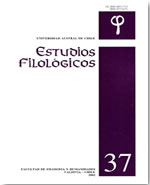Intonation, modal attitude and modality
Main Article Content
Abstract
Language users actively engage in text and talk not only as speakers, but also as members of social categories, groups, professions, societies or cultures (van Dijk 1997: 3). When we use language, we do so to produce an effect on the listener, or as a reaction to others' use of language, keeping or altering our relationship with them (Labov y Fanshel 1977). The signals that indicate this change in discourse are announced as discourse goes on, and their motivation is to report information as well as the evaluation of those who participate in the interaction (Tadros 1985). This article provides evidence that the speaker's intention as a reflection of his identity and intentionality is observed through the use of mood and modality in the text. A representative sample of 12 adolescents and adults of both sexes and three socioeconomic groups of the city of Valdivia (Chile) was analized. The results show that in a semiformal interview situation, the interviewee's intention is informative, fact that is signaled by a significantly frequent use of: 1. the informative discourse genre; 2.the representative speech acts of informing; 3. the declarative modality; 4. the indicative (factive) mood; 5. emphasizing and intensifying disjunct and subjunct adverbials; 6. descriptive and evaluating adjectives; 7. the intonational reinforcement of adverbials and adjectives and the intonational non-reinforcement of verb forms. These results vary to show that the tendencies in the use of the language are correlated with the speaker's sex, age and social group. Thus, many are the variables that are combined in oral interaction, establishing reciprocal relations in the use of genre, mood, and modality at morphological, syntactic, phonological, pragmatic and discourse levels in a specific situational contex.

